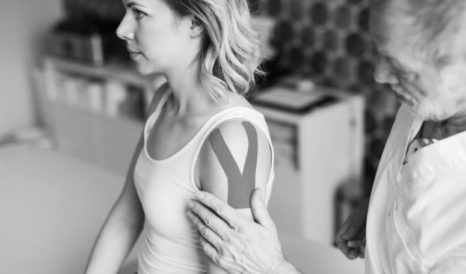Shoulder Osteoarthritis Causes, Symptoms, Treatments
Discover more about the causes, diagnosis, and treatment of shoulder osteoarthritis.

Your shoulder, like all joints in your body, can be affected by osteoarthritis. This degenerative joint disease results in pain, inflammation, lack of mobility and soft tissue damage. It can be caused by a direct shoulder injury or wear and tear over time – making it particularly common in the over-50s.
Osteoarthritis can be treated surgically or non-surgically, with treatment options including physiotherapy, steroid or other anti inflammatory injections, minimally invasive surgery or joint replacement.
What is Osteoarthritis?
Osteoarthritis is a condition where the smooth, rubbery layer of cartilage that coats the bones of your joints gets damaged or worn away. Without the cartilage, the bones catch and rub against each other. As your body tries to heal the bone damage, it can grow bony lumps called bone spurs, which cause more problems as they pinch and catch on the soft tissues and tendons that normally enable your joint to function smoothly.
The result is pain and stiffness, inflammation and reduced range of movement. Without intervention (be it surgery, injections or physical therapy), osteoarthritis will worsen over time.
Shoulder arthritis
The ball-like top of your arm bone (humerus head) sits in a dish-shaped socket in the front of your shoulder blade (scapula), and your collarbone (clavicle) is attached to this, forming the bony lump at the top of your shoulder. The joint is mobilised by stretchy tendons attached to your muscles, and stabilised by strong fibrous ligaments.
Like all your joints, smooth movement is enabled by a slick layer of cartilage on the ends of the bones and a viscous fluid. Other soft tissues provide shock absorption and reduce friction.
The degeneration of cartilage and bone in your shoulder impacts on all of the other structures in the joint, often leading to other conditions such as rotator cuff tears, bursitis and nerve impingement.
What are the Causes of Osteoarthritis in the shoulder?
Shoulder arthritis can be caused by an injury – particularly an impact on the outside of the shoulder or a fall on an outstretched arm. The force can cause the cartilage to break or tear, leading to exposed bone and degeneration of the joint surfaces.
Twisting or wrenching can also damage the tendons and muscles of the shoulder (rotator cuff), leading to weakness and instability, which can eventually lead to cartilage and bone degeneration.
Shoulder arthritis can simply be caused by wear and tear over time – repetitive or forceful movements of your shoulder such as in tennis, weight lifting, golf or manual jobs which involve overhead work.
What are the Symptoms of Osteoarthritis?
If you have any of the following symptoms, it’s important to get your shoulder checked out. An early diagnosis of osteoarthritis can avoid the need for surgery.
- Shoulder pain: Tenderness and pain deep at the back of your shoulder. It can get worse at night, making it difficult to sleep.
- Stiffness or loss of motion: decreased range of motion, making day-to-day activities like washing and dressing difficult.
- Catching: a feeling of friction as you move your shoulder. It is often associated with popping or crunching sound (crepitus).
- Weakness: if you avoid painful movements and lifting objects, it can lead to weakening (atrophy) of your muscles.
Osteoarthritis vs. Rheumatoid Arthritis
Rheumatoid arthritis is an autoimmune disease, which means that the immune system malfunctions and attacks the synovial membrane that encases and protects the joints.
This causes pain and inflammation in the joint. Unlike osteoarthritis, it tends to target several joints at once and often comes with symptoms of fever, anaemia, fatigue and loss of appetite.
Repeated inflammation of the soft tissue in your joints can lead to bone erosion and deformities, which can cause the same joint issues as osteoarthritis.
How is Osteoarthritis Diagnosed?
After an initial assessment of the range of motion and pain in your shoulder, an x-ray will show any deformities or erosion of the bones in the joint. An MRI may also be necessary to assess any soft tissue or connective tissue damage.
Treatments for shoulder Osteoarthritis
If osteoarthritis is found at an early stage, it is possible to treat the condition non-surgically.
You may be given a physiotherapy programme designed to improve the strength and flexibility in your shoulder. Targeted exercises and movements can help to relieve the pressure on the bones, reducing the chance of bone spurs and further degeneration of cartilage and bone surfaces.
The pain and inflammation of osteoarthritis can be relieved by injecting steroids or other anti inflammatory agents into your shoulder joint. Reducing the swelling and pain in tandem with physiotherapy can help you to build up the strength around your shoulder and slow the progression of osteoarthritis.
Simon Moyes also offers hyaluronic acid injections plus PRP and other cellular therapies. Hyaluronic acid is a naturally occurring lubricant in your joints, which often becomes thinner with osteoarthritis. The viscous liquid acts as a shock absorber and an anti inflammatory that has also been shown to modulate pain perception. Unlike steroids, it has no detrimental effects on tendons and no side effects. PRP
In more progressed cases of osteoarthritis, you may require surgery. This might involve trimming and smoothing damaged cartilage, removing bone spurs or smoothing bone surfaces to enable them to move more easily across each other. Surgery for glenohumeral osteoarthritis may also involve repairing soft tissue, tendon or ligament damage.
In some cases, a shoulder replacement may be necessary – using prosthetic structures to replace the damaged bone.
How Simon Moyes can help
Simon Moyes is an internationally renowned orthopaedic surgeon and leader in the field of arthroscopic (keyhole) surgery. His Capital Orthopaedics team works from The Cromwell Hospital in London, The Basinghall Clinic and The Platinum Medical Centre, with state-of-the-art diagnostic equipment, top sports medicine professionals and highly experienced medical professionals.
Contact Simon Moyes for an expert diagnosis and treatment of your shoulder problems.
